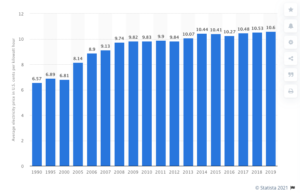With over two million solar installations across the U.S., and 6% of American homeowners saying they’ve already installed solar on their home, switching to solar is becoming the best way to reduce or almost completely eliminate your electricity bill.
If you are considering a solar installation, here are four of the main benefits you will experience:
1) Reducing or Eliminating Your Electric Bills
Indeed, the single biggest reason homeowners are switching to solar is because of the savings it presents. Not only are you paying too much for your electricity each month, but every year residential electricity rates are increasing.

According to Statistica.com, “It is projected that the residential electricity price in the United States will increase by 2.8 percent between 2020 and 2021. Generally, retail electricity prices in the country have risen over the last decade. This trend is likely to continue…”
2) Earn Tax Credits & Rebates
Recognizing the importance that homes solar systems play in reducing the overall carbon emissions, the federal government has made a federal tax credit for any homeowner who installs solar. That’s right, the government is essentially paying you up to 26% of your total costs to go solar.
But if that wasn’t enough, some utilities allow for what’s called Solar Renewable Energy Credits (SRECs) or more commonly called “net metering” that pays you back for excess electricity produced by your solar system.
The idea behind these credits is that the power grid can use additional power that your system creates so they don’t have to burn as many fossil fuels to keep up with demand. You may think that your home won’t actually produce “that much” extra power but when you combine millions of homes across America, it adds up.
Be sure to consult with your solar expert to find out about the tax credits and incentives available in your zone.
3) Start Saving from Day One
How much money do you spend each year on electricity?
The average annual energy expenses per person is an average of $3,052.
The moment your solar power system is installed and powered up, these costs disappear.
The average solar power system for a home costs between $10,000 and $26,000 depending on the size of your home. Here you can see the costs of an average solar power system per square feet of the house (note these are averages):
1,000 square foot home – $4,760 – $5,950
1,500 square foot home – $7,140 – $8,925
2,000 square foot home – $9,520 – $11,900
2,,500 square foot home – $11,900 – $14,875
3,000 square foot home – $14,280 – $17,850
With a lot of solar installation companies offering installations with zero upfront costs, you can see that not only will your solar power system start saving you money from day one, but you’ll also reach a payback period within a few years of installation.
4) Help The Environment
At last, the reason we’ve all been waiting for!
One of the most obvious benefits of solar is that it helps the environment by reducing the amount of pollution caused by burning fossil fuels to make electricity.
One aspect that’s not often viewed is that burning fossil fuels to make electricity also consumes a significant amount of water because water is used in the mining of fossil fuels. Additionally, large amounts of water are consumed to cool electricity production by natural gas and nuclear power plants.
Solar panels do not need any water to produce power and so with every solar installation, not only do we reduce the number of carbon emissions but we also help preserve the world’s water supply.
I hope that you’ve found this article helpful and informative. Bio Development offers free solar estimates and our experts are here to help answer any questions you may have about switching to solar.
Article by
Rebecca Samson
Editor, Bio Development



Recent Comments